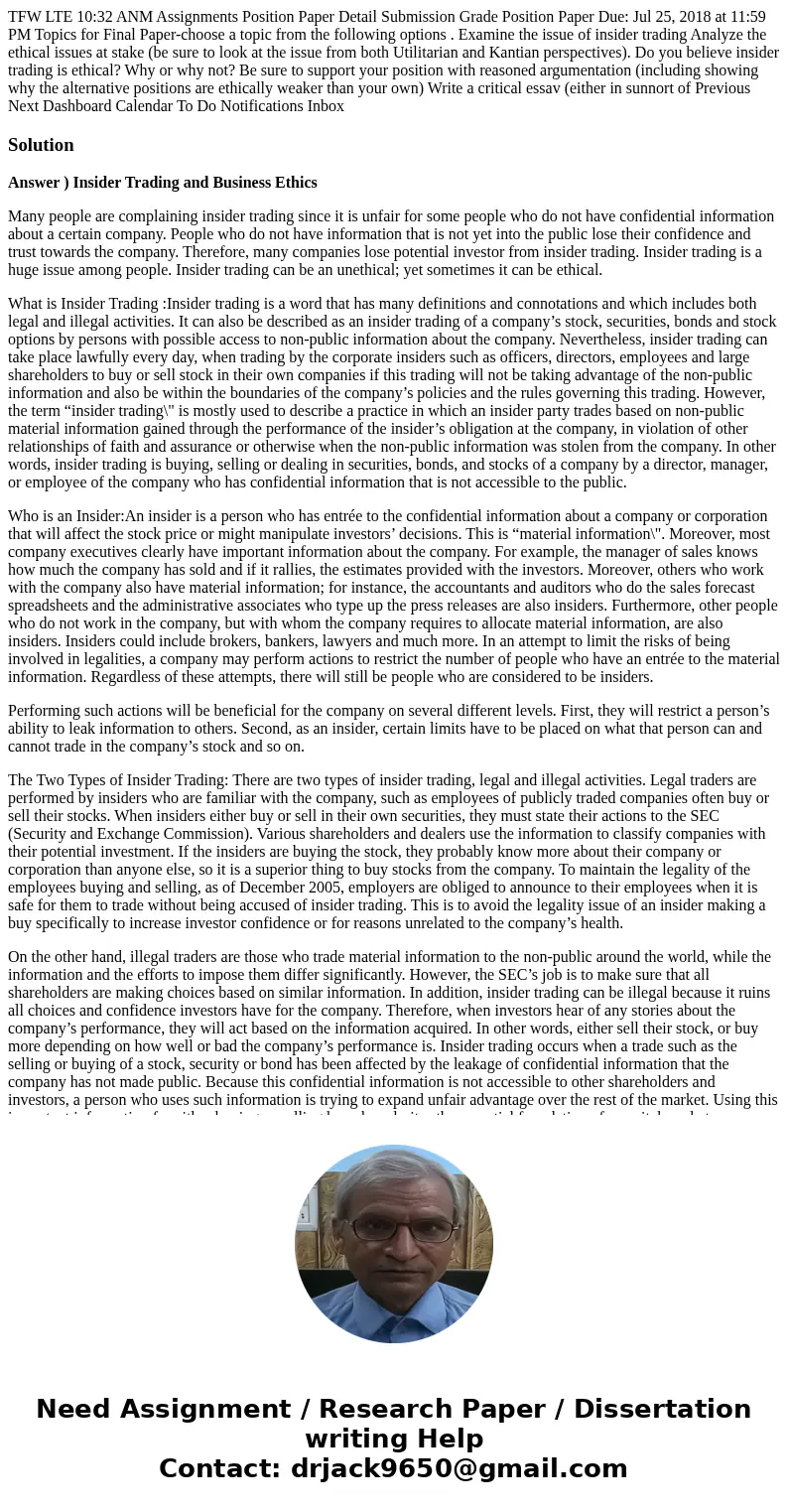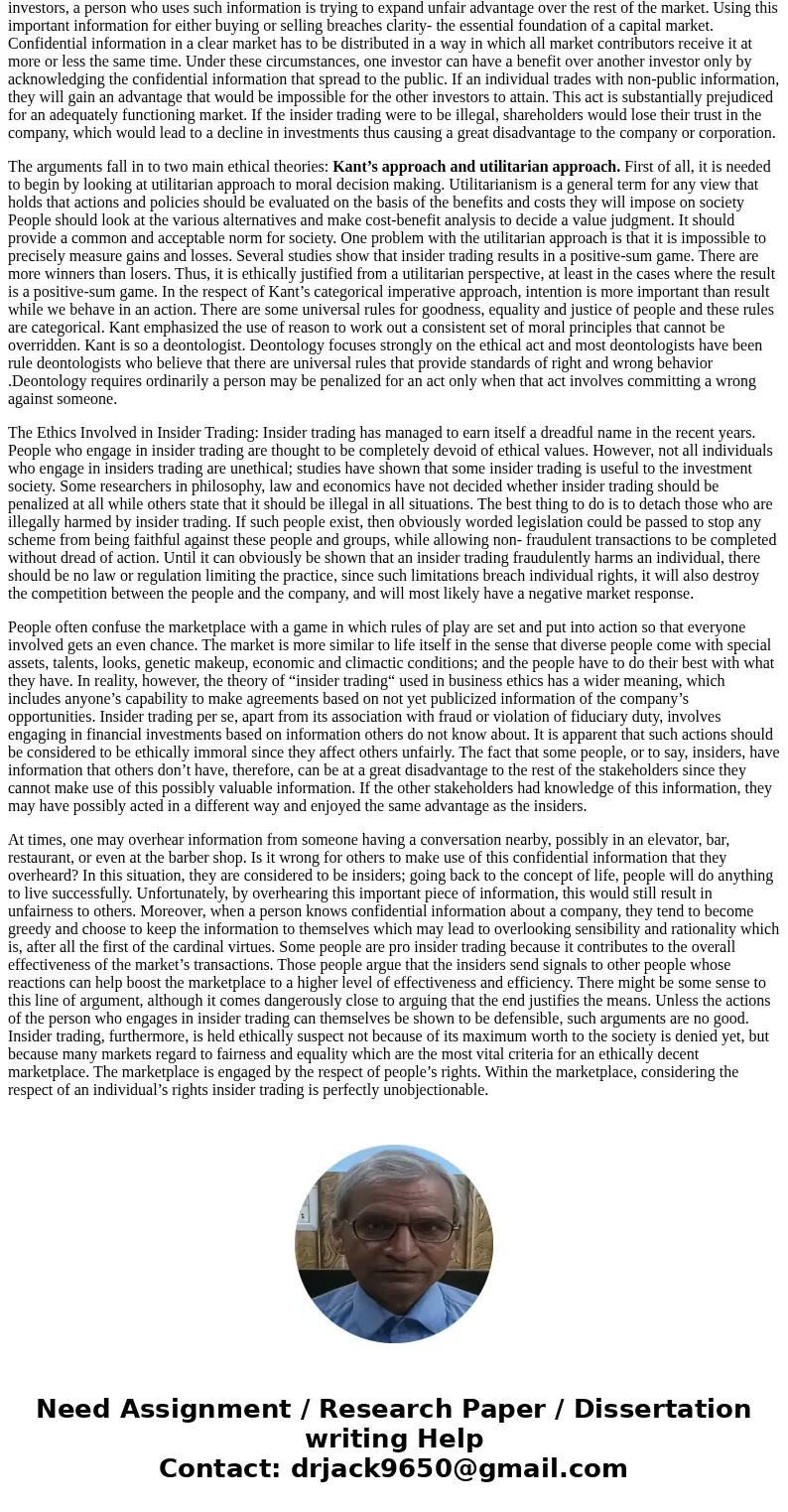TFW LTE 1032 ANM Assignments Position Paper Detail Submissio
Solution
Answer ) Insider Trading and Business Ethics
Many people are complaining insider trading since it is unfair for some people who do not have confidential information about a certain company. People who do not have information that is not yet into the public lose their confidence and trust towards the company. Therefore, many companies lose potential investor from insider trading. Insider trading is a huge issue among people. Insider trading can be an unethical; yet sometimes it can be ethical.
What is Insider Trading :Insider trading is a word that has many definitions and connotations and which includes both legal and illegal activities. It can also be described as an insider trading of a company’s stock, securities, bonds and stock options by persons with possible access to non-public information about the company. Nevertheless, insider trading can take place lawfully every day, when trading by the corporate insiders such as officers, directors, employees and large shareholders to buy or sell stock in their own companies if this trading will not be taking advantage of the non-public information and also be within the boundaries of the company’s policies and the rules governing this trading. However, the term “insider trading\" is mostly used to describe a practice in which an insider party trades based on non-public material information gained through the performance of the insider’s obligation at the company, in violation of other relationships of faith and assurance or otherwise when the non-public information was stolen from the company. In other words, insider trading is buying, selling or dealing in securities, bonds, and stocks of a company by a director, manager, or employee of the company who has confidential information that is not accessible to the public.
Who is an Insider:An insider is a person who has entrée to the confidential information about a company or corporation that will affect the stock price or might manipulate investors’ decisions. This is “material information\". Moreover, most company executives clearly have important information about the company. For example, the manager of sales knows how much the company has sold and if it rallies, the estimates provided with the investors. Moreover, others who work with the company also have material information; for instance, the accountants and auditors who do the sales forecast spreadsheets and the administrative associates who type up the press releases are also insiders. Furthermore, other people who do not work in the company, but with whom the company requires to allocate material information, are also insiders. Insiders could include brokers, bankers, lawyers and much more. In an attempt to limit the risks of being involved in legalities, a company may perform actions to restrict the number of people who have an entrée to the material information. Regardless of these attempts, there will still be people who are considered to be insiders.
Performing such actions will be beneficial for the company on several different levels. First, they will restrict a person’s ability to leak information to others. Second, as an insider, certain limits have to be placed on what that person can and cannot trade in the company’s stock and so on.
The Two Types of Insider Trading: There are two types of insider trading, legal and illegal activities. Legal traders are performed by insiders who are familiar with the company, such as employees of publicly traded companies often buy or sell their stocks. When insiders either buy or sell in their own securities, they must state their actions to the SEC (Security and Exchange Commission). Various shareholders and dealers use the information to classify companies with their potential investment. If the insiders are buying the stock, they probably know more about their company or corporation than anyone else, so it is a superior thing to buy stocks from the company. To maintain the legality of the employees buying and selling, as of December 2005, employers are obliged to announce to their employees when it is safe for them to trade without being accused of insider trading. This is to avoid the legality issue of an insider making a buy specifically to increase investor confidence or for reasons unrelated to the company’s health.
On the other hand, illegal traders are those who trade material information to the non-public around the world, while the information and the efforts to impose them differ significantly. However, the SEC’s job is to make sure that all shareholders are making choices based on similar information. In addition, insider trading can be illegal because it ruins all choices and confidence investors have for the company. Therefore, when investors hear of any stories about the company’s performance, they will act based on the information acquired. In other words, either sell their stock, or buy more depending on how well or bad the company’s performance is. Insider trading occurs when a trade such as the selling or buying of a stock, security or bond has been affected by the leakage of confidential information that the company has not made public. Because this confidential information is not accessible to other shareholders and investors, a person who uses such information is trying to expand unfair advantage over the rest of the market. Using this important information for either buying or selling breaches clarity- the essential foundation of a capital market. Confidential information in a clear market has to be distributed in a way in which all market contributors receive it at more or less the same time. Under these circumstances, one investor can have a benefit over another investor only by acknowledging the confidential information that spread to the public. If an individual trades with non-public information, they will gain an advantage that would be impossible for the other investors to attain. This act is substantially prejudiced for an adequately functioning market. If the insider trading were to be illegal, shareholders would lose their trust in the company, which would lead to a decline in investments thus causing a great disadvantage to the company or corporation.
The arguments fall in to two main ethical theories: Kant’s approach and utilitarian approach. First of all, it is needed to begin by looking at utilitarian approach to moral decision making. Utilitarianism is a general term for any view that holds that actions and policies should be evaluated on the basis of the benefits and costs they will impose on society People should look at the various alternatives and make cost-benefit analysis to decide a value judgment. It should provide a common and acceptable norm for society. One problem with the utilitarian approach is that it is impossible to precisely measure gains and losses. Several studies show that insider trading results in a positive-sum game. There are more winners than losers. Thus, it is ethically justified from a utilitarian perspective, at least in the cases where the result is a positive-sum game. In the respect of Kant’s categorical imperative approach, intention is more important than result while we behave in an action. There are some universal rules for goodness, equality and justice of people and these rules are categorical. Kant emphasized the use of reason to work out a consistent set of moral principles that cannot be overridden. Kant is so a deontologist. Deontology focuses strongly on the ethical act and most deontologists have been rule deontologists who believe that there are universal rules that provide standards of right and wrong behavior .Deontology requires ordinarily a person may be penalized for an act only when that act involves committing a wrong against someone.
The Ethics Involved in Insider Trading: Insider trading has managed to earn itself a dreadful name in the recent years. People who engage in insider trading are thought to be completely devoid of ethical values. However, not all individuals who engage in insiders trading are unethical; studies have shown that some insider trading is useful to the investment society. Some researchers in philosophy, law and economics have not decided whether insider trading should be penalized at all while others state that it should be illegal in all situations. The best thing to do is to detach those who are illegally harmed by insider trading. If such people exist, then obviously worded legislation could be passed to stop any scheme from being faithful against these people and groups, while allowing non- fraudulent transactions to be completed without dread of action. Until it can obviously be shown that an insider trading fraudulently harms an individual, there should be no law or regulation limiting the practice, since such limitations breach individual rights, it will also destroy the competition between the people and the company, and will most likely have a negative market response.
People often confuse the marketplace with a game in which rules of play are set and put into action so that everyone involved gets an even chance. The market is more similar to life itself in the sense that diverse people come with special assets, talents, looks, genetic makeup, economic and climactic conditions; and the people have to do their best with what they have. In reality, however, the theory of “insider trading“ used in business ethics has a wider meaning, which includes anyone’s capability to make agreements based on not yet publicized information of the company’s opportunities. Insider trading per se, apart from its association with fraud or violation of fiduciary duty, involves engaging in financial investments based on information others do not know about. It is apparent that such actions should be considered to be ethically immoral since they affect others unfairly. The fact that some people, or to say, insiders, have information that others don’t have, therefore, can be at a great disadvantage to the rest of the stakeholders since they cannot make use of this possibly valuable information. If the other stakeholders had knowledge of this information, they may have possibly acted in a different way and enjoyed the same advantage as the insiders.
At times, one may overhear information from someone having a conversation nearby, possibly in an elevator, bar, restaurant, or even at the barber shop. Is it wrong for others to make use of this confidential information that they overheard? In this situation, they are considered to be insiders; going back to the concept of life, people will do anything to live successfully. Unfortunately, by overhearing this important piece of information, this would still result in unfairness to others. Moreover, when a person knows confidential information about a company, they tend to become greedy and choose to keep the information to themselves which may lead to overlooking sensibility and rationality which is, after all the first of the cardinal virtues. Some people are pro insider trading because it contributes to the overall effectiveness of the market’s transactions. Those people argue that the insiders send signals to other people whose reactions can help boost the marketplace to a higher level of effectiveness and efficiency. There might be some sense to this line of argument, although it comes dangerously close to arguing that the end justifies the means. Unless the actions of the person who engages in insider trading can themselves be shown to be defensible, such arguments are no good. Insider trading, furthermore, is held ethically suspect not because of its maximum worth to the society is denied yet, but because many markets regard to fairness and equality which are the most vital criteria for an ethically decent marketplace. The marketplace is engaged by the respect of people’s rights. Within the marketplace, considering the respect of an individual’s rights insider trading is perfectly unobjectionable.


 Homework Sourse
Homework Sourse